2015年中考外研版英语一轮教材复习课件 七年级上册 Modules 6~10课件
文档属性
| 名称 | 2015年中考外研版英语一轮教材复习课件 七年级上册 Modules 6~10课件 |  | |
| 格式 | zip | ||
| 文件大小 | 3.0MB | ||
| 资源类型 | 教案 | ||
| 版本资源 | 外研版 | ||
| 科目 | 英语 | ||
| 更新时间 | 2015-04-19 21:29:06 | ||
图片预览

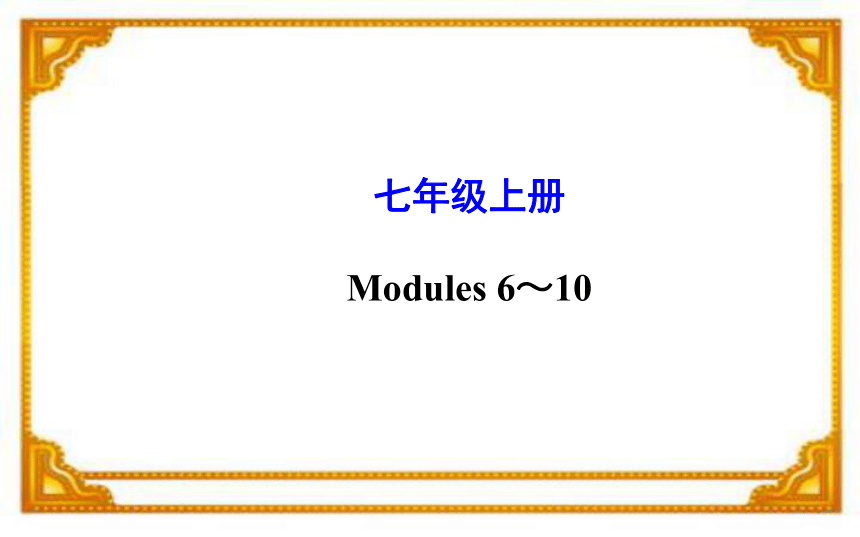
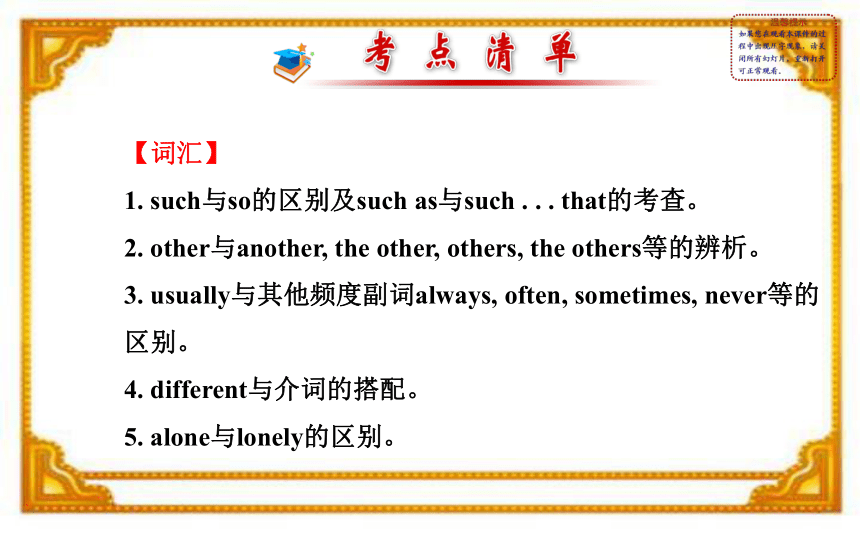
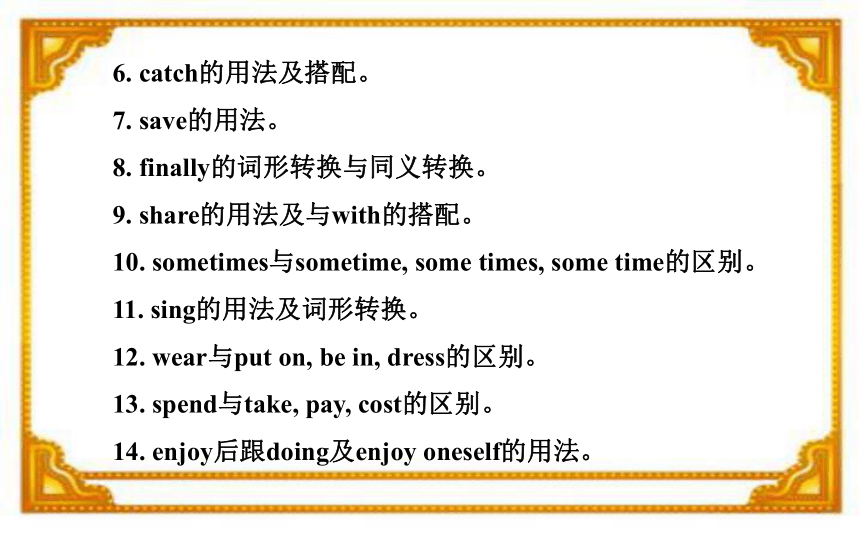
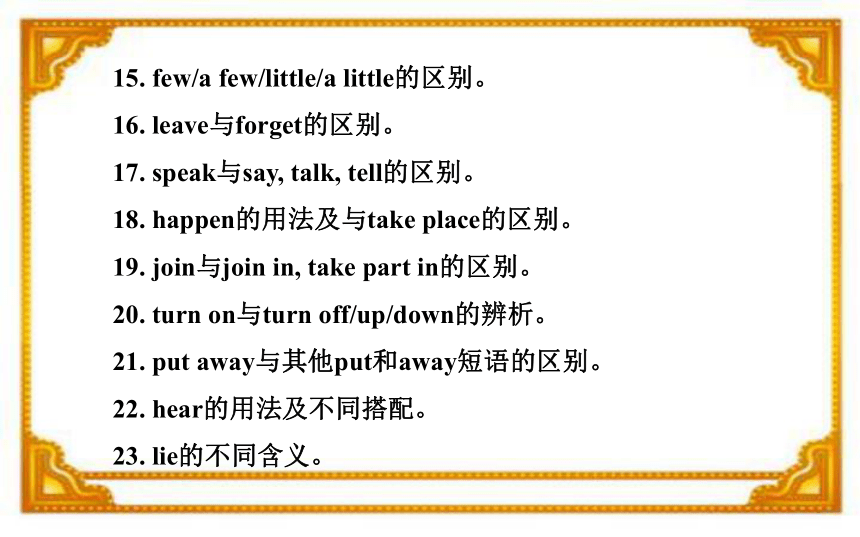
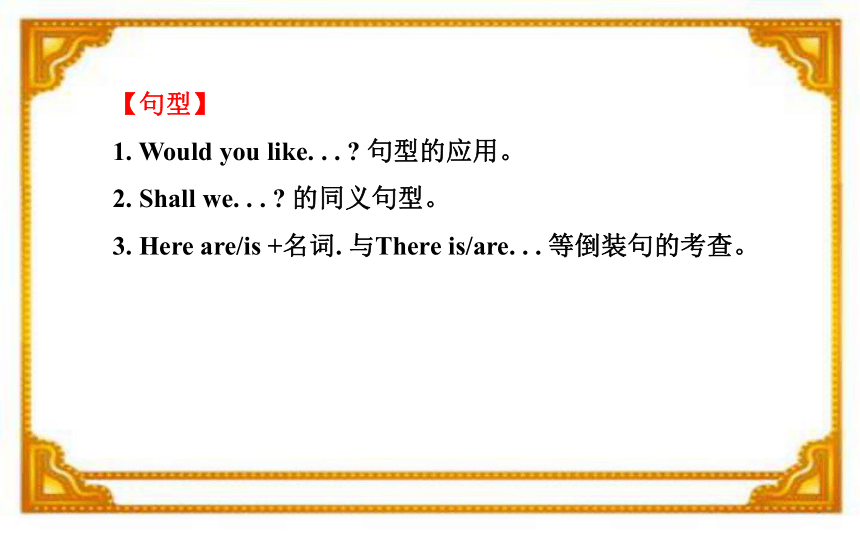
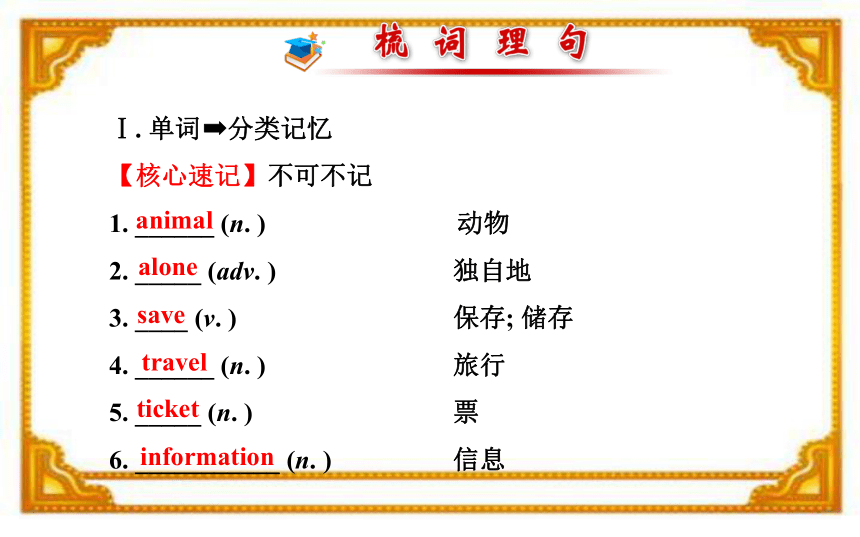
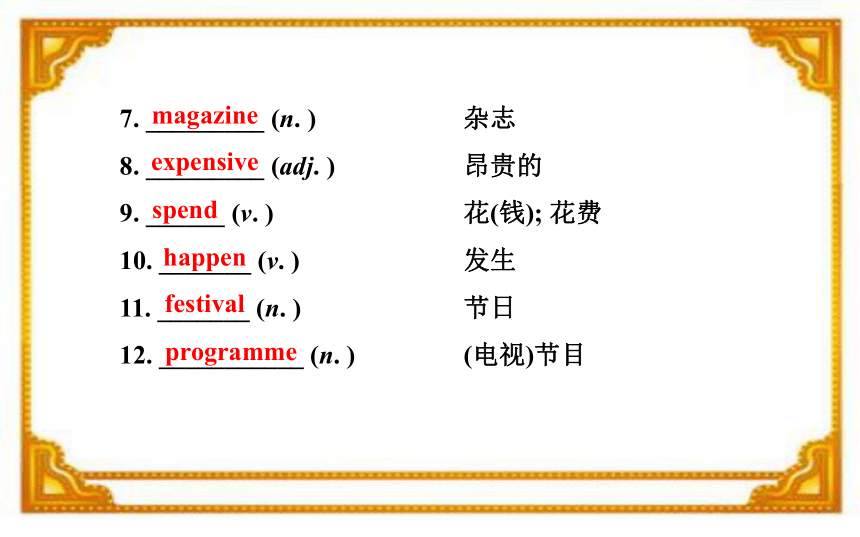
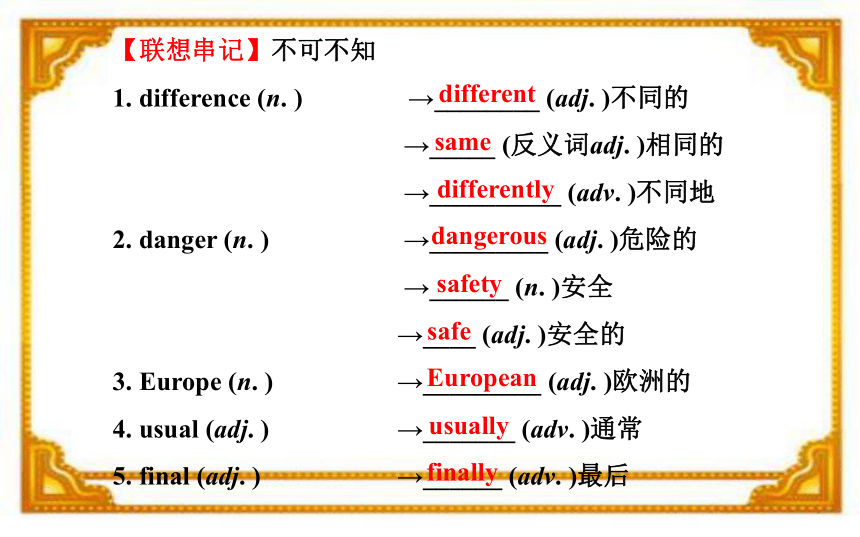
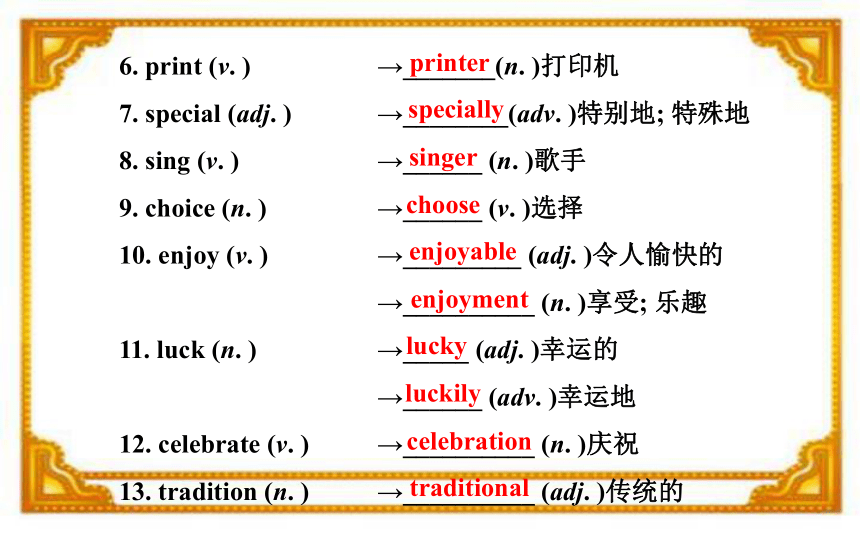
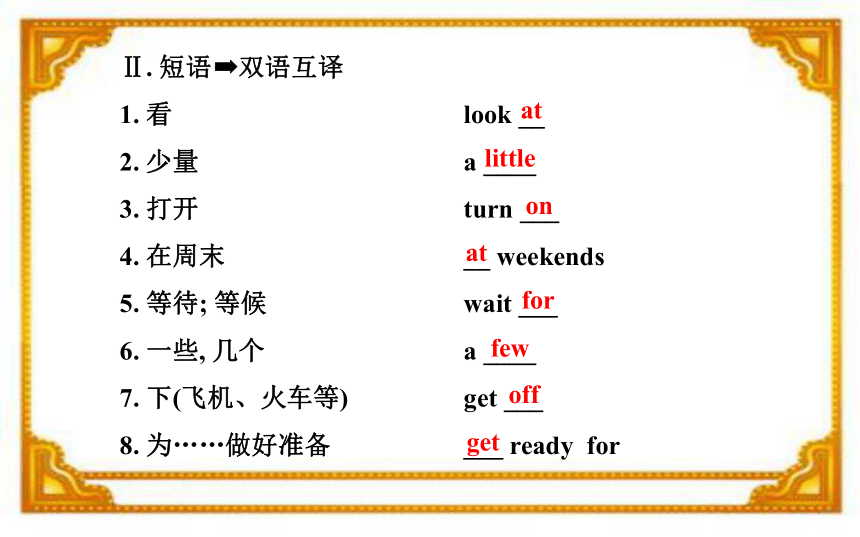
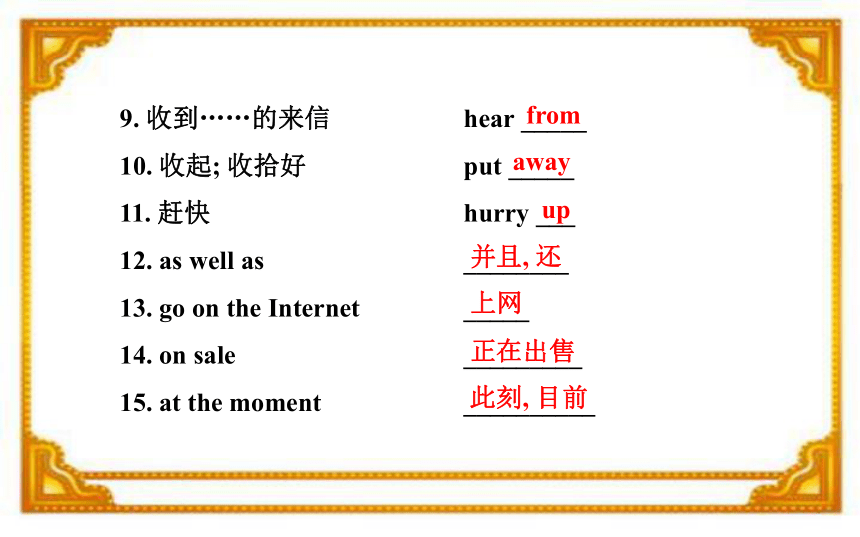
文档简介
课件72张PPT。2015年中考外研版英语一轮教材复习课件七年级上册
Modules 6~10【词汇】
1. such与so的区别及such as与such . . . that的考查。
2. other与another, the other, others, the others等的辨析。
3. usually与其他频度副词always, often, sometimes, never等的区别。
4. different与介词的搭配。
5. alone与lonely的区别。6. catch的用法及搭配。
7. save的用法。
8. finally的词形转换与同义转换。
9. share的用法及与with的搭配。
10. sometimes与sometime, some times, some time的区别。
11. sing的用法及词形转换。
12. wear与put on, be in, dress的区别。
13. spend与take, pay, cost的区别。
14. enjoy后跟doing及enjoy oneself的用法。15. few/a few/little/a little的区别。
16. leave与forget的区别。
17. speak与say, talk, tell的区别。
18. happen的用法及与take place的区别。
19. join与join in, take part in的区别。
20. turn on与turn off/up/down的辨析。
21. put away与其他put和away短语的区别。
22. hear的用法及不同搭配。
23. lie的不同含义。【句型】
1. Would you like. . . ? 句型的应用。
2. Shall we. . . ? 的同义句型。
3. Here are/is +名词. 与There is/are. . . 等倒装句的考查。 Ⅰ. 单词?分类记忆
【核心速记】不可不记
1. ______ (n. ) 动物
2. _____ (adv. ) 独自地
3. ____ (v. ) 保存; 储存
4. ______ (n. ) 旅行
5. _____ (n. ) 票
6. ___________ (n. ) 信息animalalonesavetravelticketinformation7. _________ (n. ) 杂志
8. _________ (adj. ) 昂贵的
9. ______ (v. ) 花(钱); 花费
10. _______ (v. ) 发生
11. _______ (n. ) 节日
12. ___________ (n. ) (电视)节目 magazineexpensivespendhappenfestivalprogramme【联想串记】不可不知
1. difference (n. ) →________ (adj. )不同的
→_____ (反义词adj. )相同的
→__________ (adv. )不同地
2. danger (n. ) →_________ (adj. )危险的
→______ (n. )安全
→____ (adj. )安全的
3. Europe (n. ) →_________ (adj. )欧洲的
4. usual (adj. ) →_______ (adv. )通常
5. final (adj. ) →______ (adv. )最后differentsamedifferentlydangeroussafetysafeEuropeanusuallyfinally6. print (v. ) →_______(n. )打印机
7. special (adj. ) →________(adv. )特别地; 特殊地
8. sing (v. ) →______ (n. )歌手
9. choice (n. ) →______ (v. )选择
10. enjoy (v. ) →_________ (adj. )令人愉快的
→__________ (n. )享受; 乐趣
11. luck (n. ) →_____ (adj. )幸运的
→______ (adv. )幸运地
12. celebrate (v. ) →__________ (n. )庆祝
13. tradition (n. ) →__________ (adj. )传统的printerspeciallysingerchooseenjoyableenjoymentluckyluckilycelebrationtraditionalⅡ. 短语?双语互译
1. 看 look __?
2. 少量 a ____
3. 打开 turn ___
4. 在周末 __ weekends
5. 等待; 等候 wait ___
6. 一些, 几个 a ____
7. 下(飞机、火车等) get ___
8. 为……做好准备 ___ ready foratlittleonatforfewoffget9. 收到……的来信 hear _____
10. 收起; 收拾好 put _____
11. 赶快 hurry ___
12. as well as ________
13. go on the Internet _____
14. on sale _________
15. at the moment __________fromawayup并且, 还上网正在出售此刻, 目前Ⅲ. 句型?超级填写
1. ________________. 狮子在这儿。
2. ___________bears? 熊怎么样呢?
3. ________go and see them?
我们可以去看看它们吗?
4. ___________! 她在那儿!
5. —________________come to my birthday party?
你愿意来参加我的生日宴会吗?
—Yes, _________.
是的, 我愿意。Here are the lionsWhat aboutShall weThere she isWould you like toI’d love to6. ____________back to school now.
现在到了该返校的时间了。
7. He’s still _______.
他仍然在工作。It’s time to goat work【核心词汇】
1. other adj. 其他的
【填一填 思维激活】
选词填空other/others/the other/the others/another。
①They eat animals. They are dangerous.
②I have two photos. One is black and white, and is colourful.
③The little boy is very brave and always help .
答案:①other ②the other ③others ④I don’t like the ruler. Please show me one.
⑤Many foreigners are on the bus. Three are Americans;
are Australians.
答案:④another ⑤the others 【辨一辨 考点突破】【巧学妙记】
one + the other = two
one + another ≥ three
one/some + the others = all
some + others = not all【练一练 走近中考】
(2013·凉山中考)—Is New Zealand a big country?
—No, New Zealand only has two islands. One is North Island,
is South Island.
A. other B. the other C. another2. usually adv. 通常
【填一填 思维激活】
①On days, I get up at six o’clock. (usual/usually)
②She usually buys presents for her family. (对画线部分提问)
does she buy presents for her family?
答案:①usual; usually ②How often ③托尼有时候上课会迟到, 但从来不忘做作业。
Tony late for class, but he to do his homework.
答案:is sometimes; never forgets 【辨一辨 考点突破】
(1)频度副词always/usually/often/sometimes/hardly/never的相同点(2)频度副词always/usually/often/sometimes/hardly/never的不同点
【温馨提示】usually的形容词形式为usual。【练一练 走近中考】
(2014·安徽中考)If my friends have any problems, my door is
open to them.
A. never B. seldom C. sometimes D. always3. wear v. 穿; 戴
【填一填 思维激活】选词填空put on/wear/dress/in。
①It’s very cold outside today, Daming. Please your coat if you want to go out.
②They sometimes T-shirts.
③The boy a white shirt is our English teacher’s son.
④The child is too young to himself.
答案:①put on ②wear ③in/wearing ④dress 【辨一辨 考点突破】“穿”的不同【练一练 走近中考】
(2014·齐齐哈尔中考)—I’m leaving now.
— your coat. It’s cold outside.
A. Wear B. Putting on C. Put on4. enjoy v. 享受……的乐趣; 喜爱
【填一填 思维激活】
①我们非常喜欢这次学校旅行。
We’re the school trip .
②My father enjoys (watch) the programs on CCTV 5.
③Look! The children are having a good time now. (改为同义句)
Look! The children are now.
答案:①enjoying; a lot ②watching ③enjoying themselves ④你工作中最有乐趣的是哪部分?
What’s the most part of your job?
答案:enjoyable【记一记 知识构建】【归纳拓展】
enjoy v. 享受
enjoyable adj. 愉快的
enjoyment n. 乐趣【练一练 走近中考】
①(2013·潍坊中考)大明喜欢听英语歌曲。(enjoy)
?
答案:Daming enjoys listening to English songs.
②(2012·滨州中考)We know that she enjoys books very much.
A. read B. reads C. reading D. to read5. speak v. 说话, 讲话
【填一填 思维激活】选词填空say/speak/talk/tell。
①Hi, Li Ling. This is Tony .
②Please the boy not to make noise in class.
③We shouldn’t about others.
④What else did you at yesterday’s meeting?
答案: ①speaking ②tell ③talk ④say 【看一看 图解考点】say/speak/talk/tell“说”不同【练一练 走近中考】
(2013·青岛中考)—Do you know why he didn’t a word when he to?
—Because he was too nervous.
A. speak; speaks B. say; was spoken
C. say; spoke D. speak; is spoken6. a little少量
【填一填 思维激活】
①它吃植物和少量水果, 但不吃肉。
It eats plants and fruit, but it doesn’t eat meat.
②There is little water in the glass, ? (完成反意疑问句)
③There is a little bread for breakfast. (改为同义句)
There is bread for breakfast.
答案:①a little ②is there ③a bit of 【辨一辨 考点突破】few/a few/little/a little的用法辨析【温馨提示】a little与a bit的不同用法
①a little+不可数名词=a bit of+不可数名词
②not a little=quite a lot“非常多的”
not a bit=not at all“一点也不”【练一练 走近中考】
①(2014·铜仁中考)In our school, students like English, but of them can speak English smoothly.
A. a little; a few B. a few; few
C. a few; little D. a little; few
②(2013·重庆中考)The girl in purple is new here, so
people know her.
A. few B. a few
C. little D. a little【重点句型】
1. Shall we go and see them?
我们可以去看看它们吗?
【思一思 句型剖析】
句型shall we do sth. ? 常用在疑问句中, 用来征求对方意见或向对方提出建议, 用于第一人称。例如:
Shall we go to the museum?
我们去博物馆, 好吗? 【归纳拓展】
回答建议的常用句型:
(1)肯定答语:
Good idea. /OK. /All right. /Sure. /Certainly.
(2)否定答语:
No, thanks. /Sorry, I can’t. /I’m afraid not. 【练一练 走近中考】
(2013·宁波中考)—Tomorrow will be fine. Shall we go out for a picnic?
— .
A. Sounds great B. Good luck
C. Have fun D. Take it easy2. —Would you like to come to my birthday party?
你愿意来参加我的生日宴会吗?
—Yes, I’d love to. 是的, 我愿意。
【思一思 句型剖析】
(1)Would you like to do. . . ? “你愿意做……吗? ”常用于向对方有礼貌地提出建议或发出邀请, like还可以用love代替; 肯定回答: Yes, I’d love to. ; 否定回答: I’d love to, but. . . 。
(2)Would you like some. . . ? “你想要一些……吗? ”常用于征求对方意见, 肯定回答: Yes, please. ; 否定回答: No, thanks. 。(3)would like的不同搭配:
①would like sth. =want sth. 想要某物
would like to do sth. =want to do sth. 想要做某事
②would like sb. to do sth. =want sb. to do sth. 想要某人做某事【练一练 走近中考】
(2014·重庆中考·A卷)—Would you like something to drink?
— . I’m thirsty.
A. Yes, I can B. No, thanks
C. Yes, please D. No, I don’t like it【要点备选】
1. lie v. 躺; 平躺
【填一填 思维激活】
用lie的适当形式填空。
①Daming is having lunch and in the sun.
②The boy often to his mother in the past.
③The hen many eggs in its life.
答案: ①lying ②lied ③laid【记一记 知识构建】【图解助记】 lie的不同含义2. hurry v. 赶快; 匆忙
【填一填 思维激活】
①The boy hurried school without breakfast this morning. (in/to)
②快一点, 不然我们就赶不上校车了。
, or we won’t catch the school bus.
③He always hurries to do everything. (改为同义句)
He always does everything .
答案: ①to ②Hurry up ③in a hurry【记一记 知识构建】3. sometimes adv. 有时候; 不时
【填一填 思维激活】
选词填空sometimes/sometime/some times/some time。
①I’ll go to see you next week.
② I play a lot of games and my mother doesn’t like it.
③I phoned him last night, but there was no reply.
④It took them to get to the airport.
答案: ①sometime ②Sometimes ③some times ④some time【辨一辨 考点突破】【练一练 走近中考】
①(2013·黄石中考)It is usually very hot in June, but
s it can be cool.
答案:sometimes
②(2011·黔西南州中考)—What do you often do after supper?
—I often watch TV, but sometimes go out for a walk.
A. sometimes B. sometime
C. at times D. some time4. leave v. 离开
【填一填 思维激活】
①明天他将动身去广州。
He will Guangzhou tomorrow.
②这个粗心的女孩总是把钥匙忘在办公室。
The careless girl always her keys at the office.
③现在冷了, 别让门敞开着。
It’s cold now. Please don’t the door open.
答案: ①leave for ②leaves ③leave 【记一记 知识构建】leave的两种词性【温馨提示】
forget也有“遗忘”之意, 但只能用forget sth. , 后不能跟地点状语。【练一练 走近中考】
(2013·襄阳中考)—Show me your homework, Dave?
—Sorry, Mrs Brown. I’ve it at home.
A. missed B. forgotten C. lost D. left5. happen v. 发生
【填一填 思维激活】
①那位可怜的老人昨天发生了车祸。
A car accident the poor old man yesterday.
②The May 4 Movement in 1919. (took place/happened)
③I happened (meet) my college history teacher in the street today.
答案: ①happened to ②took place ③to meet 【记一记 知识构建】
happen的用法
(1)sth. happens/happened to sb. 某人发生某事
(2)sb. happens/happened to do sth. 某人碰巧做某事
(3)It happens/happened that 碰巧……【妙辨异同】happen/take place的辨析【练一练 走近中考】
①(2014·泸州中考)Can you tell me what happened
him just now?
A. with B. for C. to D. at
②(2013·荆门中考)请告诉我事故是什么时候发生的好吗?
Could you tell me ? (happen)
答案: when the accident happened6. hear from收到……来信
【填一填 思维激活】
选词填空from/of/about。
①Did you hear your daughter this week?
②I’ve just heard his illness.
③I have never heard him since he left.
答案: ①from ②about ③of【记一记 知识构建】【练一练 走近中考】
(2014·重庆中考·B卷)They get a letter from their son twice a month. (改为同义句)
They their son twice a month.
答案: hear from7. get off 下(飞机、火车、公共汽车等)
【填一填 思维激活】
选词填空get on/get off/get in/get out of。
①Don’t the bus before it stops.
②You may the taxi at the crossing. The school is just across the street.
答案: ①get off ②get out of【辨一辨 考点突破】
(1)对于taxi, car等小型交通工具, “上车”用get in, “下车”用get out of。
(2)对于ship, bus, train, plane等大型交通工具, “上去”用get on, “下去”用get off。【图解助记】8. Here are the lions. 狮子在这儿。
【思一思 句型剖析】
(1)当here, there等副词放在句首时, 句子需倒装, 即“谓语+主语”结构。但这种倒装仅限于be动词或不及物动词, 像go, come, run等。
(2)当主语是代词时, 句子不需倒装, 即保持“主语+谓语”结构。【练一练 走近中考】
(2012·安徽中考)Hey, Nick. comes the last bus! Hurry up, or we’ll have to walk home.
A. This B. There C. That D. It
Modules 6~10【词汇】
1. such与so的区别及such as与such . . . that的考查。
2. other与another, the other, others, the others等的辨析。
3. usually与其他频度副词always, often, sometimes, never等的区别。
4. different与介词的搭配。
5. alone与lonely的区别。6. catch的用法及搭配。
7. save的用法。
8. finally的词形转换与同义转换。
9. share的用法及与with的搭配。
10. sometimes与sometime, some times, some time的区别。
11. sing的用法及词形转换。
12. wear与put on, be in, dress的区别。
13. spend与take, pay, cost的区别。
14. enjoy后跟doing及enjoy oneself的用法。15. few/a few/little/a little的区别。
16. leave与forget的区别。
17. speak与say, talk, tell的区别。
18. happen的用法及与take place的区别。
19. join与join in, take part in的区别。
20. turn on与turn off/up/down的辨析。
21. put away与其他put和away短语的区别。
22. hear的用法及不同搭配。
23. lie的不同含义。【句型】
1. Would you like. . . ? 句型的应用。
2. Shall we. . . ? 的同义句型。
3. Here are/is +名词. 与There is/are. . . 等倒装句的考查。 Ⅰ. 单词?分类记忆
【核心速记】不可不记
1. ______ (n. ) 动物
2. _____ (adv. ) 独自地
3. ____ (v. ) 保存; 储存
4. ______ (n. ) 旅行
5. _____ (n. ) 票
6. ___________ (n. ) 信息animalalonesavetravelticketinformation7. _________ (n. ) 杂志
8. _________ (adj. ) 昂贵的
9. ______ (v. ) 花(钱); 花费
10. _______ (v. ) 发生
11. _______ (n. ) 节日
12. ___________ (n. ) (电视)节目 magazineexpensivespendhappenfestivalprogramme【联想串记】不可不知
1. difference (n. ) →________ (adj. )不同的
→_____ (反义词adj. )相同的
→__________ (adv. )不同地
2. danger (n. ) →_________ (adj. )危险的
→______ (n. )安全
→____ (adj. )安全的
3. Europe (n. ) →_________ (adj. )欧洲的
4. usual (adj. ) →_______ (adv. )通常
5. final (adj. ) →______ (adv. )最后differentsamedifferentlydangeroussafetysafeEuropeanusuallyfinally6. print (v. ) →_______(n. )打印机
7. special (adj. ) →________(adv. )特别地; 特殊地
8. sing (v. ) →______ (n. )歌手
9. choice (n. ) →______ (v. )选择
10. enjoy (v. ) →_________ (adj. )令人愉快的
→__________ (n. )享受; 乐趣
11. luck (n. ) →_____ (adj. )幸运的
→______ (adv. )幸运地
12. celebrate (v. ) →__________ (n. )庆祝
13. tradition (n. ) →__________ (adj. )传统的printerspeciallysingerchooseenjoyableenjoymentluckyluckilycelebrationtraditionalⅡ. 短语?双语互译
1. 看 look __?
2. 少量 a ____
3. 打开 turn ___
4. 在周末 __ weekends
5. 等待; 等候 wait ___
6. 一些, 几个 a ____
7. 下(飞机、火车等) get ___
8. 为……做好准备 ___ ready foratlittleonatforfewoffget9. 收到……的来信 hear _____
10. 收起; 收拾好 put _____
11. 赶快 hurry ___
12. as well as ________
13. go on the Internet _____
14. on sale _________
15. at the moment __________fromawayup并且, 还上网正在出售此刻, 目前Ⅲ. 句型?超级填写
1. ________________. 狮子在这儿。
2. ___________bears? 熊怎么样呢?
3. ________go and see them?
我们可以去看看它们吗?
4. ___________! 她在那儿!
5. —________________come to my birthday party?
你愿意来参加我的生日宴会吗?
—Yes, _________.
是的, 我愿意。Here are the lionsWhat aboutShall weThere she isWould you like toI’d love to6. ____________back to school now.
现在到了该返校的时间了。
7. He’s still _______.
他仍然在工作。It’s time to goat work【核心词汇】
1. other adj. 其他的
【填一填 思维激活】
选词填空other/others/the other/the others/another。
①They eat animals. They are dangerous.
②I have two photos. One is black and white, and is colourful.
③The little boy is very brave and always help .
答案:①other ②the other ③others ④I don’t like the ruler. Please show me one.
⑤Many foreigners are on the bus. Three are Americans;
are Australians.
答案:④another ⑤the others 【辨一辨 考点突破】【巧学妙记】
one + the other = two
one + another ≥ three
one/some + the others = all
some + others = not all【练一练 走近中考】
(2013·凉山中考)—Is New Zealand a big country?
—No, New Zealand only has two islands. One is North Island,
is South Island.
A. other B. the other C. another2. usually adv. 通常
【填一填 思维激活】
①On days, I get up at six o’clock. (usual/usually)
②She usually buys presents for her family. (对画线部分提问)
does she buy presents for her family?
答案:①usual; usually ②How often ③托尼有时候上课会迟到, 但从来不忘做作业。
Tony late for class, but he to do his homework.
答案:is sometimes; never forgets 【辨一辨 考点突破】
(1)频度副词always/usually/often/sometimes/hardly/never的相同点(2)频度副词always/usually/often/sometimes/hardly/never的不同点
【温馨提示】usually的形容词形式为usual。【练一练 走近中考】
(2014·安徽中考)If my friends have any problems, my door is
open to them.
A. never B. seldom C. sometimes D. always3. wear v. 穿; 戴
【填一填 思维激活】选词填空put on/wear/dress/in。
①It’s very cold outside today, Daming. Please your coat if you want to go out.
②They sometimes T-shirts.
③The boy a white shirt is our English teacher’s son.
④The child is too young to himself.
答案:①put on ②wear ③in/wearing ④dress 【辨一辨 考点突破】“穿”的不同【练一练 走近中考】
(2014·齐齐哈尔中考)—I’m leaving now.
— your coat. It’s cold outside.
A. Wear B. Putting on C. Put on4. enjoy v. 享受……的乐趣; 喜爱
【填一填 思维激活】
①我们非常喜欢这次学校旅行。
We’re the school trip .
②My father enjoys (watch) the programs on CCTV 5.
③Look! The children are having a good time now. (改为同义句)
Look! The children are now.
答案:①enjoying; a lot ②watching ③enjoying themselves ④你工作中最有乐趣的是哪部分?
What’s the most part of your job?
答案:enjoyable【记一记 知识构建】【归纳拓展】
enjoy v. 享受
enjoyable adj. 愉快的
enjoyment n. 乐趣【练一练 走近中考】
①(2013·潍坊中考)大明喜欢听英语歌曲。(enjoy)
?
答案:Daming enjoys listening to English songs.
②(2012·滨州中考)We know that she enjoys books very much.
A. read B. reads C. reading D. to read5. speak v. 说话, 讲话
【填一填 思维激活】选词填空say/speak/talk/tell。
①Hi, Li Ling. This is Tony .
②Please the boy not to make noise in class.
③We shouldn’t about others.
④What else did you at yesterday’s meeting?
答案: ①speaking ②tell ③talk ④say 【看一看 图解考点】say/speak/talk/tell“说”不同【练一练 走近中考】
(2013·青岛中考)—Do you know why he didn’t a word when he to?
—Because he was too nervous.
A. speak; speaks B. say; was spoken
C. say; spoke D. speak; is spoken6. a little少量
【填一填 思维激活】
①它吃植物和少量水果, 但不吃肉。
It eats plants and fruit, but it doesn’t eat meat.
②There is little water in the glass, ? (完成反意疑问句)
③There is a little bread for breakfast. (改为同义句)
There is bread for breakfast.
答案:①a little ②is there ③a bit of 【辨一辨 考点突破】few/a few/little/a little的用法辨析【温馨提示】a little与a bit的不同用法
①a little+不可数名词=a bit of+不可数名词
②not a little=quite a lot“非常多的”
not a bit=not at all“一点也不”【练一练 走近中考】
①(2014·铜仁中考)In our school, students like English, but of them can speak English smoothly.
A. a little; a few B. a few; few
C. a few; little D. a little; few
②(2013·重庆中考)The girl in purple is new here, so
people know her.
A. few B. a few
C. little D. a little【重点句型】
1. Shall we go and see them?
我们可以去看看它们吗?
【思一思 句型剖析】
句型shall we do sth. ? 常用在疑问句中, 用来征求对方意见或向对方提出建议, 用于第一人称。例如:
Shall we go to the museum?
我们去博物馆, 好吗? 【归纳拓展】
回答建议的常用句型:
(1)肯定答语:
Good idea. /OK. /All right. /Sure. /Certainly.
(2)否定答语:
No, thanks. /Sorry, I can’t. /I’m afraid not. 【练一练 走近中考】
(2013·宁波中考)—Tomorrow will be fine. Shall we go out for a picnic?
— .
A. Sounds great B. Good luck
C. Have fun D. Take it easy2. —Would you like to come to my birthday party?
你愿意来参加我的生日宴会吗?
—Yes, I’d love to. 是的, 我愿意。
【思一思 句型剖析】
(1)Would you like to do. . . ? “你愿意做……吗? ”常用于向对方有礼貌地提出建议或发出邀请, like还可以用love代替; 肯定回答: Yes, I’d love to. ; 否定回答: I’d love to, but. . . 。
(2)Would you like some. . . ? “你想要一些……吗? ”常用于征求对方意见, 肯定回答: Yes, please. ; 否定回答: No, thanks. 。(3)would like的不同搭配:
①would like sth. =want sth. 想要某物
would like to do sth. =want to do sth. 想要做某事
②would like sb. to do sth. =want sb. to do sth. 想要某人做某事【练一练 走近中考】
(2014·重庆中考·A卷)—Would you like something to drink?
— . I’m thirsty.
A. Yes, I can B. No, thanks
C. Yes, please D. No, I don’t like it【要点备选】
1. lie v. 躺; 平躺
【填一填 思维激活】
用lie的适当形式填空。
①Daming is having lunch and in the sun.
②The boy often to his mother in the past.
③The hen many eggs in its life.
答案: ①lying ②lied ③laid【记一记 知识构建】【图解助记】 lie的不同含义2. hurry v. 赶快; 匆忙
【填一填 思维激活】
①The boy hurried school without breakfast this morning. (in/to)
②快一点, 不然我们就赶不上校车了。
, or we won’t catch the school bus.
③He always hurries to do everything. (改为同义句)
He always does everything .
答案: ①to ②Hurry up ③in a hurry【记一记 知识构建】3. sometimes adv. 有时候; 不时
【填一填 思维激活】
选词填空sometimes/sometime/some times/some time。
①I’ll go to see you next week.
② I play a lot of games and my mother doesn’t like it.
③I phoned him last night, but there was no reply.
④It took them to get to the airport.
答案: ①sometime ②Sometimes ③some times ④some time【辨一辨 考点突破】【练一练 走近中考】
①(2013·黄石中考)It is usually very hot in June, but
s it can be cool.
答案:sometimes
②(2011·黔西南州中考)—What do you often do after supper?
—I often watch TV, but sometimes go out for a walk.
A. sometimes B. sometime
C. at times D. some time4. leave v. 离开
【填一填 思维激活】
①明天他将动身去广州。
He will Guangzhou tomorrow.
②这个粗心的女孩总是把钥匙忘在办公室。
The careless girl always her keys at the office.
③现在冷了, 别让门敞开着。
It’s cold now. Please don’t the door open.
答案: ①leave for ②leaves ③leave 【记一记 知识构建】leave的两种词性【温馨提示】
forget也有“遗忘”之意, 但只能用forget sth. , 后不能跟地点状语。【练一练 走近中考】
(2013·襄阳中考)—Show me your homework, Dave?
—Sorry, Mrs Brown. I’ve it at home.
A. missed B. forgotten C. lost D. left5. happen v. 发生
【填一填 思维激活】
①那位可怜的老人昨天发生了车祸。
A car accident the poor old man yesterday.
②The May 4 Movement in 1919. (took place/happened)
③I happened (meet) my college history teacher in the street today.
答案: ①happened to ②took place ③to meet 【记一记 知识构建】
happen的用法
(1)sth. happens/happened to sb. 某人发生某事
(2)sb. happens/happened to do sth. 某人碰巧做某事
(3)It happens/happened that 碰巧……【妙辨异同】happen/take place的辨析【练一练 走近中考】
①(2014·泸州中考)Can you tell me what happened
him just now?
A. with B. for C. to D. at
②(2013·荆门中考)请告诉我事故是什么时候发生的好吗?
Could you tell me ? (happen)
答案: when the accident happened6. hear from收到……来信
【填一填 思维激活】
选词填空from/of/about。
①Did you hear your daughter this week?
②I’ve just heard his illness.
③I have never heard him since he left.
答案: ①from ②about ③of【记一记 知识构建】【练一练 走近中考】
(2014·重庆中考·B卷)They get a letter from their son twice a month. (改为同义句)
They their son twice a month.
答案: hear from7. get off 下(飞机、火车、公共汽车等)
【填一填 思维激活】
选词填空get on/get off/get in/get out of。
①Don’t the bus before it stops.
②You may the taxi at the crossing. The school is just across the street.
答案: ①get off ②get out of【辨一辨 考点突破】
(1)对于taxi, car等小型交通工具, “上车”用get in, “下车”用get out of。
(2)对于ship, bus, train, plane等大型交通工具, “上去”用get on, “下去”用get off。【图解助记】8. Here are the lions. 狮子在这儿。
【思一思 句型剖析】
(1)当here, there等副词放在句首时, 句子需倒装, 即“谓语+主语”结构。但这种倒装仅限于be动词或不及物动词, 像go, come, run等。
(2)当主语是代词时, 句子不需倒装, 即保持“主语+谓语”结构。【练一练 走近中考】
(2012·安徽中考)Hey, Nick. comes the last bus! Hurry up, or we’ll have to walk home.
A. This B. There C. That D. It
